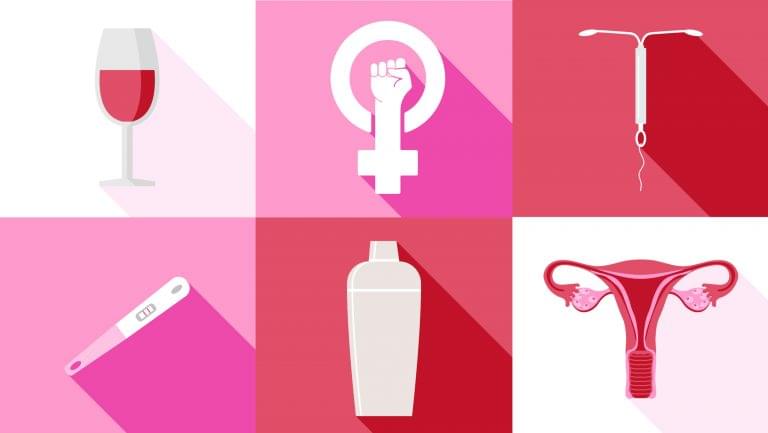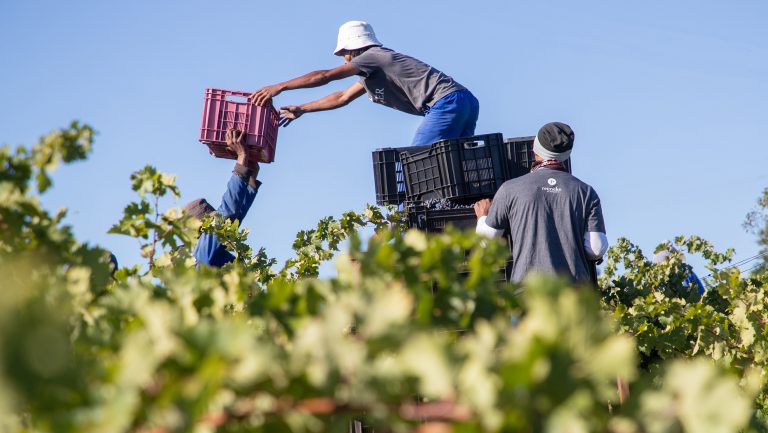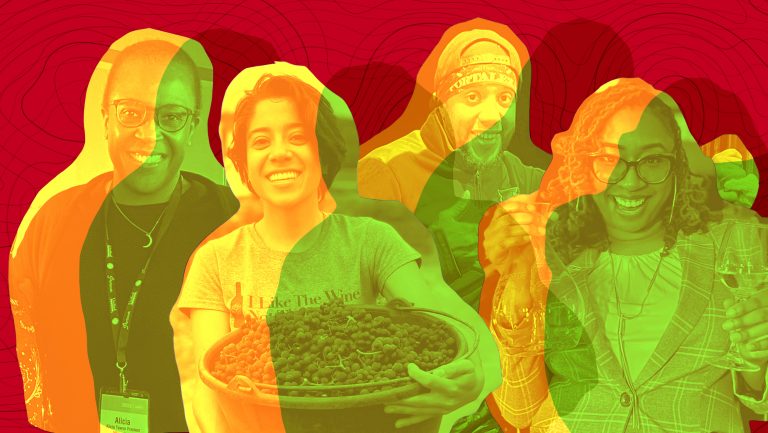In 2013, when Tamara Morehead got pregnant, Mary Ellen Angel, her manager at the now-defunct Houston bar Okra, let her work until she was so big that the bottles in the well were poking her belly. “I was almost eight months pregnant, working six days a week, 12-hour shifts,” says Morehead. “I made so much money that I was able to take five months off.”
Though Okra didn’t offer paid leave, Angel secured Morehead’s position and supported her when she returned. “I was breastfeeding, so Mary Ellen let me take breaks to pump. I had a special private space in the office,” says Morehead. “Paying all these baby bills and still having that income was great. I’ve been at other bars where girls got pregnant, and they were like, ‘We have to let you go.’”
Later, when Morehead got pregnant again, she decided that she couldn’t afford another child, and she had an abortion. “I hope I never have to do that again, but I’m glad it was an option. I come from a Christian background, and I still feel that everyone should make their own choices,” she says.

Don’t miss the latest drinks industry news and insights. Sign up for our award-winning newsletters and get insider intel, resources, and trends delivered to your inbox every week.
One formal benefit Okra offered to staff was paying half the insurance premiums for those who chose to obtain insurance through the Affordable Care Act. Though Morehead had declined Affordable Care Act coverage, she got care through Healthy Texas Women, a program for low-income residents. She also had a manager who supported her need, as a pregnant and parenting woman, to earn a living. And she made her choices years before June 24, 2022, when the Supreme Court overturned Roe v. Wade, erasing the constitutional right to abortion and triggering laws that ban the procedure in states including Texas.
In an industry with low wages and few benefits, Morehead was lucky. But what is the situation for most hospitality workers? “People don’t care about the women who get pregnant,” she says, speaking of the industry.
Now, some hospitality professionals are fighting back. Bar owners, bartenders, and leaders of nonprofits are raising funds, establishing networks, overhauling workplace policies, and flexing political muscle to protect the lives and livelihoods of hospitality workers who are able to get pregnant, ensure the bodily autonomy of everyone in service, and rethink the industry’s approach to healthcare access in general. The hospitality industry, they say, must take better care of its workers.
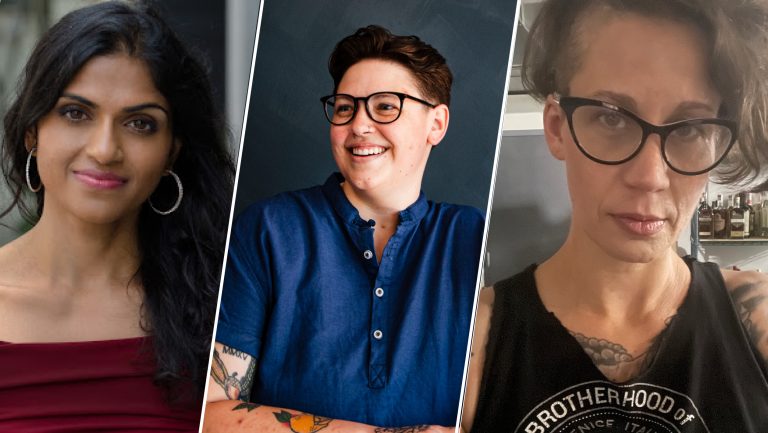
No Place to Be Pregnant
The numbers support Morehead’s summation. In a sector employing 70 percent women, not even a third of hospitality workers receive employer-sponsored health benefits and less than half get paid sick leave. That’s compared to 77 percent of all private-sector workers who receive those same benefits.
Over half of food and beverage workers are parents, says Aaron Gregory Smith, the executive director of the United States Bartenders’ Guild (USBG). Yet, access to family leave is poor. Here’s why: Nationally, 23 percent of all U.S. workers receive paid family leave, and 89 percent get unpaid leave. But the lower the wage, the less likely workers are to have access to family leave. Among the lowest-paid 10 percent of workers, only six percent get paid family leave, while 78 percent obtain some unpaid leave. With the federal subminimum wage for tipped work at $2.13 an hour, hospitality workers are the lowest paid of any industry. According to One Fair Wage, which fights for livable incomes for service workers, seven of the 10 lowest paying jobs are in restaurants and four of those are in tipped positions. No insurance, no leave, no fair wage—for many, that’s an untenable situation in which to carry a pregancy or seek an abortion.
The risk of unwanted pregnancy is exacerbated by an unsafe work environment. Over 14 percent of sexual harrassment cases are filed by hospitality workers, more than any other industry. Ninety percent of women and 70 percent of men in restaurants have been sexually harrassed. “The lack of bodily autonomy and consent is prevalent. It’s how hospitality is structured, where people coming in off the street feel the right to dictate what happens to you,” says Chelsea Gregoire, the owner of Baltimore’s Church and a member of Tales of the Cocktail’s Beyond the Bar committee, which focuses on health and social issues.
Work hours augment the danger. “In a population with the highest rates of assault, harrassment, and, frankly, rape, it’s not just coworkers, managers, owners, and customers, but the vulnerablity of women walking home from work late at night,” says One Fair Wage’s president Saru Jayaraman. The only professionals more vulnerable are sex workers, notes Zack Sanders, a Los Angeles-based educator with Safe Bars, which trains bar staff to intervene against sexual violence.
The presence of alcohol makes matters worse. One study claims that half of sexual assault perpetrators were intoxicated, and another found that aggressors—90 percent men targeting women—homed in on intoxicated victims. And, as Aims Villanueva-Alf, the owner of Black Moon Koven in Juneau, Alaska, points out, there’s a high risk of unwanted pregnancy from consensual sex, too: “Being a woman in this industry, and also adding alcohol to it, I’ve heard many horror stories of people that I worked with: ‘Oh, my god, we had shift drinks and then I banged the prep cook.’”
With the food and beverage sector a major employer in states like Tennessee that have now banned abortion, and others like Ohio that have severely restricted it, the stakes are high. “In an industry largely staffed by women and folks of color, with the lack of care in general and the stress and trauma that folks are put through, it can’t be over-emphasized how troubling these legal decisions are,” says Travis Nass, the COO of Another Round Another Rally, which provides emergency assistance to hospitality workers. “If folks aren’t stepping up to battle now, when’s the time?”
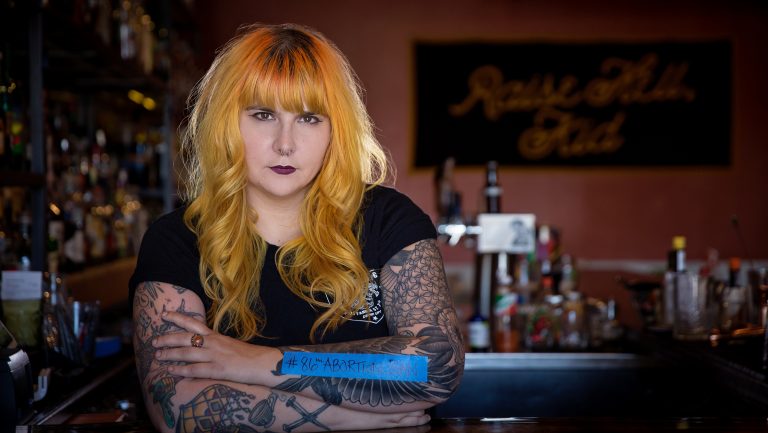
Speaking Up for Reproductive Rights
“Bars and taverns are where we used to have these conversations. They built the bar before they built the church,” says Lindsay Rae Burleson, paraphrasing from Christine Sismondo’s 2014 history book, America Walks into a Bar. Burleson is the owner of Houston’s Two-Headed Dog and the Pelican and the Shark in Galveston, Texas. She also works with I’ll Have What She’s Having (IHWSH), which provides Texas’ food and beverage workers with advocacy and access to health services. She speaks frequently at rallies and to media. “In Houston, I’m the lady who’s always talking about abortion,” she says.
But even while on shift, “a bartender talks to around 100 people a day,” Burleson points out. “Given the opportunity, we change culture. There’s a mighty untapped fountain of communication in the industry that we could organize. Allow that pamphlet to sit in your bathroom, put that Plan B vending machine in, let your bartender wear that shirt, use your social media. Show up for your community openly.”
That includes fundraising for reproductive rights. In 2021, Texas’ SB8 put a bounty of $10,000 civil lawsuits on providers or facilitators of an abortion performed after detection of embryonic cardiac activity. In response, Burleson created Pro Choice Summer, with happy hours throughout Houston to benefit organizations like the Center for Reproductive Rights. Now she’s shifting her fundraising focus to PACs like Naral that are fighting to codify abortion rights into law.
Burleson is just one among many bartenders nationwide who are fundraising for the cause. Following a benefit she threw during Tales of the Cocktail, Ivy Mix, a co-owner of Brooklyn’s Leyenda and cofounder of Speed Rack, organized the nationwide Power Shift party, which called on bars across the U.S. to host an event on August 18—the 102nd anniversary of the ratification of the 19th Amendment—with proceeds going to Lift Louisiana, which is fighting for reproductive rights in Tales’ host state.
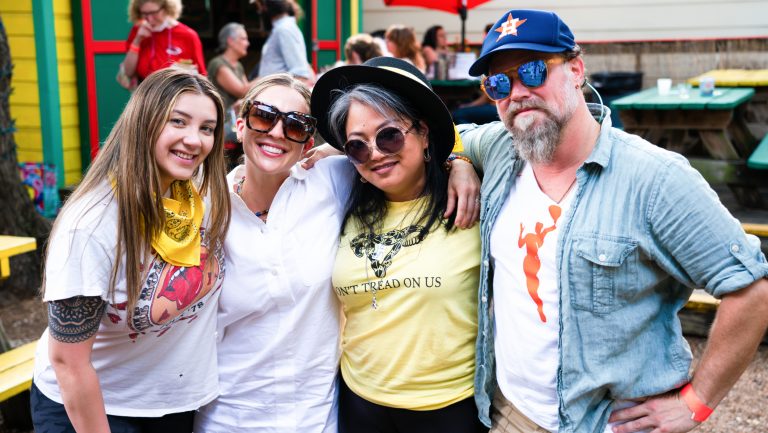
Mix and her co-organizers encouraged participants to secure brand sponsorship for Power Shift. That’s one way to hold producers and distributors accountable. Jill Cockson is using the opposite tactic. The owner of Kansas City, Missouri’s Chartreuse Saloon and Swordfish Tom’s, Drastic Measures in Shawnee, Kansas, and the upcoming Anna’s Place in Omaha, told her suppliers that she was “researching products, distributors, and producers, and will give priority to those that are in alignment” with her support of abortion rights. She has already “parted ways” with suppliers who oppose her stance or remain silent.
“It was cool to know where they stand and not write them checks. But I’ve been discovering awesome, new woman-owned brands in the process,” says Cockson. “And we’re forging stronger relationships with locals we’re aligned with. I want to support local, but I am not going to support local assholes.”
Taking such a stand shouldn’t be hard for a non-corporate bar, she argues. “The only reason you need to stay silent is if you erred in your business plan or are at the mercy of big dollars,” says Cockson. “If you want a space with integrity, you have to figure out a business plan that can make money on that integrity.”
Bars Taking Care of Their Own
Drinks pros are also circling wagons to care for workers who are in need of reproductive services or otherwise affected by the Roe reversal. Amie Ward, a Baltimore-based educator with Safe Bars, has seen “a flood of requests for training following the decision”—not only to fight sexual assault, but to de-escalate “an elevation of stressors and violence” over opinions about abortion.
A safe work environment is essential to helping staff access the care they need. “If you make a safe space at work, it becomes that great family we all know from bartending, and that’s when people can come to each other and be like, ‘I need to get this abortion. How do I do it?’” says Another Round Another Rally CEO Amanda Gunderson. “Then as a team, you can figure it out.”
Though the economics of an independent bar might preclude employer-paid health benefits, owners can still “cultivate a space where people can be vulnerable and we’re supporting them,” says Villanueva-Alf, who provides staff with mental health days. “I want them to go take care of themselves. I had people say, ‘I have to go down to the Lower 48 for some things.’ It’s easy for me to say, ‘I’m going to check on airlines. I got you a ticket.’ I’ve done that a lot for employees. I want them to have what they need if I can provide it.”
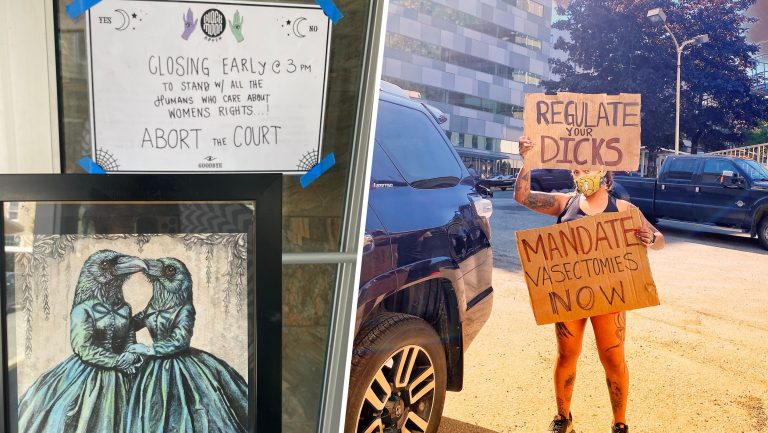
Says Beyond the Bar’s Gregoire, “It’s about creative solutions to what seem to be gigantic problems,” including telehealth and partnering with affordable providers. Cockson pays for a low-cost concierge physician for her workers and she provides full benefits to full-time staff who’ve worked for her for a year, which is an affordable outlay for a bar with few full-timers.
Other establishments have devised novel ways of structuring businesses so that benefits and paid leave are possible. “We provide mental health coverage, family leave, paternity leave—anything my staff needs,” says Kate Gerwin, the co-owner of Happy Accidents in Albuquerque, New Mexico. “I prioritized health insurance because I worked for shitty people who didn’t, and every time I needed care, I either didn’t get it or tried to go around it holistically. But there’s no holistic substitute for abortion.”
Gerwin and her business partner, Blaze Montana, can afford the benefits because they have a craft distillery license. Rather than buying through expensive middlemen, they make direct purchases of bulk spirits or distill their own. “We operate at a different pricing structure than bars that work through distributors, and that enables us to channel our profits back into our staff,” says Gerwin. State laws vary, so owners in other states with different rules around craft distilling might not have this option. But in New Mexico, where the tipped wage is $2.13, Happy Accidents pays $10 per hour plus benefits. With staff averaging $30 to $40 in tips an hour, “it’s a viable career.”
Though Gerwin, like many owners, has stockpiled Plan B pills for staff, she lives in a state that doesn’t restrict abortions. For Mary Ellen Angel, who took over Okra in 2021 and renamed it Angel Share, the cost of operating a pro-choice bar in an anti-choice state has proven high. Continuing the bar’s mission to donate to causes voted on by patrons, Angel’s current list of charity nominees includes the League of Women Voters, the American Civil Liberties Union, and Planned Parenthood—at the national level. “It’s unclear if you’re criminally libel for donating to abortion funds based in Texas,” she says. “We’re focusing on voter registration and lawyers because those are the people that can help us now.”
Being an activist in an abortion-ban state has its risks, however. As of August 1, Angel can no longer afford the 50 percent she was paying for staff’s health, dental, and vision insurance. “Premiums went up 14 percent last year, and we’ve been vocal about supporting abortion funds, so business has suffered,” she says. “In Texas, we’re in survival mode.”
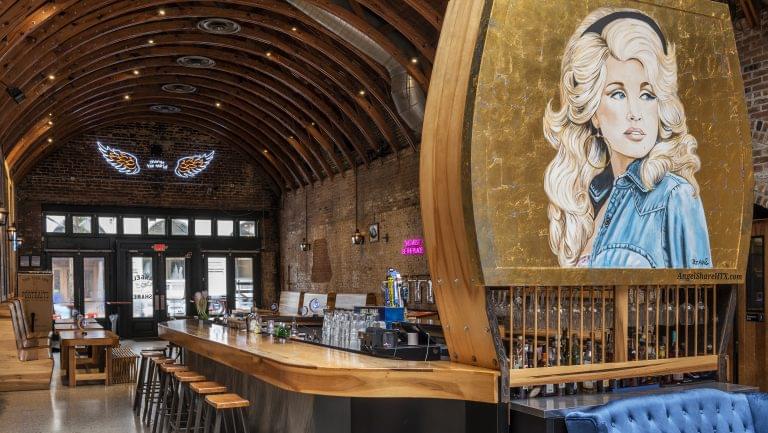
Getting Services to Hospitality Workers
For hospitality workers needing reproductive care in abortion-ban states, grassroots resources exist. The USBG has a Bartender Emergency Assistance Program to which drinks pros can apply. But with states like Texas threatening to revoke nonprofit status from entities breaking fast-moving laws, Smith says the USBG must proceed with caution and copious legal advice: “We’re not going to break the law and put the emergency assistance program at risk.”
Another Round Another Rally is working on an undisclosed initiative that, Gunderson says, involves “figuring out not only how to get the healthcare to people, but how to get people to other states to access care.” In the meantime, she says, “if there are women, nonbinary folks, or transgender men in the industry that find themselves in a precarious situation, they can apply for the funding through our Emergency Aid portal, or send one of us an email and we will help strategize.”
IHWSH is taking a multi-pronged approach. In Texas, they’re starting an ambassador program, sending food and drinks pros into bars and restaurants to offer access to “long-acting, reversible contraception: IUDs, hormonal implants, and vasectomies,” explains Lori Choi, the vascular surgeon who founded IHWSH. The group is also working with One Fair Wage to “create a plan to provide every restaurant worker in the country with access to contraception and safe and legal abortion” through their newly launched Service Worker Reproductive Access Fund.
“We are paying for transportation and for the healthcare, the pill, the checkup, or an abortion—whatever they need,” says Jayaraman.
Says Choi, whose husband is a chef, “The restaurant industry is not capitulating. We are taking matters into our own hands because we’re not getting our solution from the government any time soon.”
Changing the Industry on a Broader Scale
Still, as activists build an interstate network for reproductive care, they and others are also advocating for government policies that would help the hospitality industry evolve. One Fair Wage fights for a fair living wage for service workers, pushing the issue at local and state levels. Where income and reproductive care are concerned, “we have to see the two issues as inextricably linked,” says Jayaraman. “We have the highest population of single mothers of any industry. Most workers can’t afford an abortion even if they can get it. We ultimately need policy that guarantees paid family leave, reproductive health, and a livable wage.”
Recently, in Michigan, One Fair Wage teamed up with Fems for Dems to collect signatures for their respective issues: raising minimum wage to $15, and securing reproductive rights. “Sometimes policymakers don’t get it, but people on the ground immediately got the connection,” says Jayaraman. “What’s the point in having choice if you don’t have the means, or the means and no choice? Most Americans deeply understand both are needed.”
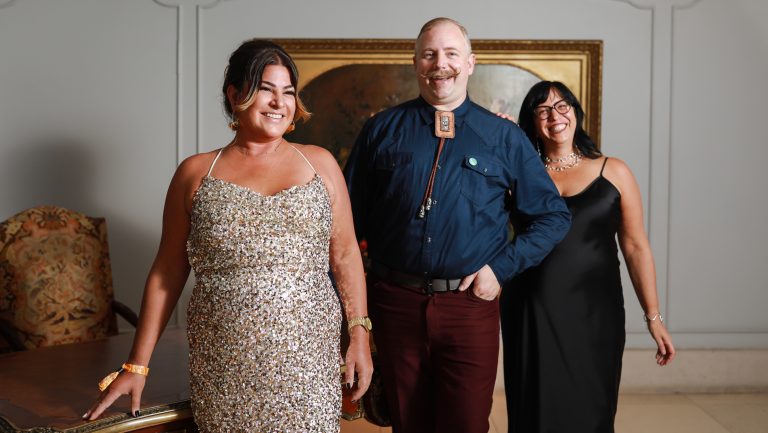
Another IHWSH fundraising partner, MAPP Impact, which supports women’s leadership in the food industry, has been campaigning with the National Partnership for Women and Families for affordable, accessible child care and paid family leave at the national level. “A federal policy enables everyone to do it because it’s through national insurance, so a small business doesn’t have to pay out of pocket to cover one employee’s full salary,” says Joanna James, the founder of MAPP Impact.
She’s sanguine about the ability of women in the industry to advocate for policies that will improve their lives. “Hospitality is the most public-facing industry. We can be at the forefront because we have such a connection,” she says. “It’s letting your following and customers know, ‘There are issues that are important to us all, and they affect you, too.’”
Or, as Burleson says of her abortion rights activism in Texas, “Bars fundamentally serve their communities. I’m seeing that the largest part of my community is not being served. If I’m paying my light bill and the people that work for me based off the community’s dollars, and I exist in support of the community, then I’m going to frickin‘ support it.”

Dispatch
Sign up for our award-winning newsletter
Don’t miss the latest drinks industry news and insights—delivered to your inbox every week.
Betsy Andrews is an award-winning journalist and poet. Her latest book is Crowded. Her writing can be found at betsyandrews.contently.com.

